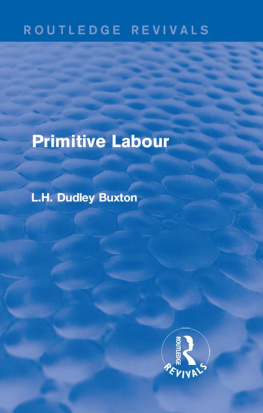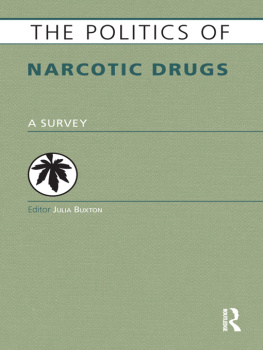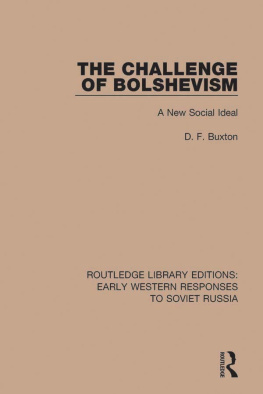First published in 1924
by Methuen & Co. Ltd
This edition first published in 2015 by Routledge
2 Park Square, Milton Park, Abingdon, Oxon, OX14 4RN
and by Routledge
711 Third Avenue, New York, NY 10017
Routledge is an imprint of the Taylor & Francis Group, an informa business
1924 L.H. Dudley Buxton
All rights reserved. No part of this book may be reprinted or reproduced or utilised in any form or by any electronic, mechanical, or other means, now known or hereafter invented, including photocopying and recording, or in any information storage or retrieval system, without permission in writing from the publishers.
Publishers Note
The publisher has gone to great lengths to ensure the quality of this reprint but points out that some imperfections in the original copies may be apparent.
Disclaimer
The publisher has made every effort to trace copyright holders and welcomes correspondence from those they have been unable to contact.
A Library of Congress record exists under LC control number: 70115315
ISBN 13: 978-1-138-18201-1 (hbk)
ISBN 13: 978-1-315-64662-6 (ebk)
PRIMITIVE LABOUR
BY
L. H. DUDLEY BUXTON, M.A.
LECTURER IN PHYSICAL ANTHROPOLOGY IN THE UNIVRRSITY OF OXFORD AND FORMEKLY ALBERT KAHN TRAVELLING FELLOW
The Scope of the Inquiry and the Methods of Study
T HE picture of a man cast on a desert island, with no resources but the natural products of the soil and his own two hands, has been a favourite subject for the speculations of writers of fiction, most of whom have cut the Gordian knot by supplying the convenient wreck of a ship or other material advantage to the poor castaway. It is possible, however, to study the method whereby man has developed his culture, not perhaps from that shadowy time when he ceased to be an ape and became a man, but at least from a time when his material resources were very limited. We can study the origin of invention from two points of view as archologists or as ethnologists; in the former case we must rely on the evidence of the fragments that remain from a remote period in mans history; in the latter we can visit and observe the culture of tribes who have proved but backward scholars in the arts of life.
Within recent years, perhaps more than ever before, civilized man has had occasion to dig deeply into the surface of the earth, to secure adequate foundations for big buildings, to make the roads and streets of cities, and to quarry clay and sand for building. Agriculture also, especially in those countries where civilization is most deeply rooted, has turned over the earths surface to a considerable extent with the ploughshare. During these manifold labours man has occasionally exposed the remains of his predecessors, sometimes extremely ancient, sometimes comparatively modern. Often the archologist has gained great treasures, more frequently only fragmentary remains have rewarded his researches. Sufficient material has, however, now been collected to enable the student to reconstruct, in a comparatively complete way, the remains of bygone stages of culture.
At the same time travellers have been industriously traversing the habitable globe so that there remain few tribes, however isolated, whose culture has not been examined, at least summarily. We have, therefore, at our disposal not only the actual weapons that our early ancestors used, but also their survivals among primitive tribes. These interesting and valuable documents are no longer placed on a dusty shelf of a museum labelled, if labelled at all, Curiosities from the South Sea Islands, but are carefully studied and, most valuable of all, are accompanied by careful accounts of their use, made by observers in the field, and by photographs which throw the greatest light on the methods of the primitive craftsman.
The archologist and the ethnologist can, not infrequently, work together and summon, if necessary, the expert opinion of the geographer. We can sometimes recognize among primitive peoples a tool or weapon, which perhaps in an identical or slightly modified form was in use in Europe before the dawn of history. In many cases observations made on modern tools enable us to reconstruct parts of ancient tools which were made of a perishable material which has long since disappeared. In this way, for instance, by comparing the method of hafting stone axes among modern primitive races we can see how the neolithic celt was in all probability hafted by its maker. The analogy, of course, must not be pressed too closely; there may often be different conditions or converging lines of evolution which are misleading if we draw a parallel over hastily, but the general statement holds good.
In early times when the general level of culture was low, most arts were fairly wide-spread and seem to have had a fairly continuous distribution. To-day there are widely different cultures, scattered over the globe with a continuous or, in the case of the less developed, a discontinuous distribution. The same inventive genius which has enabled man to triumph over his surroundings has made him singularly anxious to adopt other peoples inventions when they seem good to him. Culture-contact is therefore masking inventions and making it often difficult to disentangle the original elements of certain cultures. The lower may borrow from the higher; matches, for instance, seem to precede the explorer into the untrodden depths of the wilderness; or the higher may borrow from the lower and the heir of all the ages, the culture of the west, adopts Indian corn, cocoa, quinine and tobacco from the Indians they profess to despise.
It is extremely difficult to find people living in a state of culture which has not been affected by the missionary, the trader, the explorer or the official, and these activities are by no means limited to the white manso that a culture is always changing not only by its own initiative, but also owing to forces acting from the outside. Our impressions, therefore, of peoples may be very erroneous if they are based on specimens in museums, which have been collected at various times, or from accounts of observers which were written at different dates.















